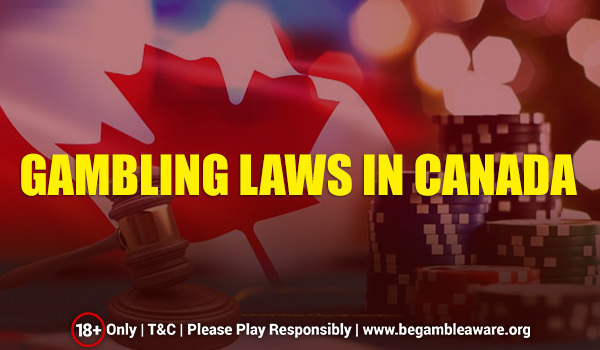Online gambling has experienced unprecedented growth over the past ten years or so. In 2009, the industry was worth around $25 billion. Today, this figure has expanded to well over $60 billion thanks to remote betting and, most notably, online casino gaming. According to Gambling Insider, 11% of all internet traffic is now generated by casino gamers.

This explosion in popularity has had many governments scrambling to implement rules to ‘protect’ their citizens. However, their efforts are being complicated by the speed in which the industry is growing, with many countries continually playing catch-up to what has become an agile and unpredictable sector. The result is often a disorganised patchwork of regulations that can cause confusion for both operators and consumers. Thankfully, when it comes to online gambling laws Canada offers a clearer legal framework although there are a few grey areas.
Land-Based Casino Gambling Laws in Canada
As per the Criminal Code Act of 1892 and a subsequent 1910 amendment, gambling in Canada was originally limited to Parimutuel betting and games of chance, from which profits were donated to charitable causes.
In 1970, major changes were made to the Criminal Code, allowing Canadian provinces to license and regulate gambling. Fifteen years later, the country’s territories and provinces were given greater freedom to oversee the operation of slots as well as lotteries.
Following the widespread liberalisation of gambling laws in Canada, casinos started opening throughout the country. The first was opened in Winnipeg in 1989, followed by another one in Montreal four years later. Other provinces soon followed suit including Manitoba, Quebec, Ontario, Saskatchewan and Nova Scotia. While the laws on land-based establishment are fairly clear, things become more complicated with regards to online casino gambling
Online Casino Gambling Laws in Canada
Under existing legislation, provinces are allowed to organise and operate gambling establishments as well as online casinos. Thus in 2004, the British Columbia Lottery Corporation unveiled Canada’s first legal online casino, PlayNow.com.
But there remains a great deal of confusion about online casinos based overseas. This is because the Criminal Code stipulates specifically that only the Canadian Government and/or its provinces are allowed to operate any kind of gambling.
Nevertheless, more than 1000 online casinos offer their services to Canadian residents. And so far, only a few have been prosecuted. One of the most notable lawsuits occurred in 2001, when Delaware-based operator, Starnet Communications was forced to pay around $6 million CAD to the province of British Columbia. In 2013, Ontario authorities seized more than $2 million in user-funds of Platinum Sports Book.
However, such prosecutions are few and far between because of the jurisdictional problems that relate to oversees casinos. Canadian laws do not apply to operators based in foreign countries such as Gibraltar and Malta, where online gambling is perfectly legal.
And while it’s difficult to determine whether or not gambling online is technically ‘illegal’, there are absolutely no examples of Canadian residents being prosecuted as a result of such activities. So as it stands, there’s no reason why you can’t play at an overseas casino that is registered and licensed to operate in its country of origin.
Author: Adrienne
Posted On: 25/07/2019
-
Basic Online Roulette Strategies
As with our ...
-
Basic Strategies of Online Blackjack
For the pur ...
-
Land-Based Casino Games in Canada – An Overview
Despite the ...
